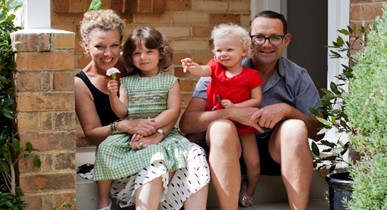Can Money Buy You Happiness

Can money can buy happiness? That depends on how you spend it. Dr Melanie Woodfield offers eight tips for getting more bang for your buck.
Doughnuts? Or maybe cronuts? Whatever your pleasure, they’re worth every penny, or so says a friend of mine. We were talking over coffee the other day about a particular café in Auckland that does the most divine doughnuts. She was recounting, in detail, how she’d sat down, child-free, and eaten one. Not that morning, but several months ago. She could still remember the taste, the smell, the topping, the crunchy gooeyness of that banana caramel ball of bliss. Five dollars had bought her an experience she still talks about. And that’s the gist of this article. How to spend a little to get a lot.
Now it goes without saying (and research backs this up) that our relationships with others are the best source of happiness. Investing in relationships with family and friends will give the greatest happiness return, without costing much more than time. When baby arrives money tends to get tight. Couples often drop to one income, and some parents are doing it all alone. Given that there’s probably not a lot of spare money around, we want to feel as though we’re getting maximum happiness return for our dollars and cents.
Can money buy happiness? Sometimes it can, if you spend it wisely. I’ve pulled together eight tips on how to do this, drawn from positive psychology research. Positive psychology sounds as though it should involve chanting affirmations (“I am amazing!”) in front of the mirror, but it’s actually the scientific study of happiness. One of the pioneers in this field was Professor Martin Seligman, who, many years ago, noticed that much of psychology was focussed on mental illness. Very little time was spent thinking about wellness, and how we can feel happier. Since then, he and other important thinkers have kept up the momentum, and positive psychology is booming.
Before we talk money, let’s get the basics straight. It’s a fact that some people are naturally happier than others, and this is mostly related to our temperament, or personality. Some people are naturally fairly melancholic, or tend towards sadness. Others are perpetually upbeat. Almost everyone experiences natural changes in their mood according to life’s ups and downs. We expect that we’ll feel pleasure and happiness in response to lovely things happening. And it’s natural and normal to feel a bit down when hard things happen, or we’re disappointed. But each of us are pre-wired to return to a particular level of happiness after life throws us a high or low – this is our happiness set point. Researchers suggest that the set point accounts for around 50% of how happy we are, while about 10% is due to our life experiences, and 40% is a result of our personal outlook. That final 40% can be influenced by some thoughtful, intentional activity, like spending money differently. So, no matter what your set point is, there’s still lots of room for movement.
1 Buy more experiences and fewer things
We often think that buying things will make us happy, but it’s experiences that usually bring the most happiness. Of course some things are a bit of both – a new car is an object, but gives you an experience. Cronuts, too. But why buy experiences? One explanation is that we adapt to new objects so very quickly. While we might have spent months deliberating over which wallpaper to use in the kids’ room, pretty quickly it becomes something we look past without noticing it. In contrast, we continue to delight in the memory of the trip to Queenstown in the autumn, or that sunny day at the zoo with friends. Another reason is that we both anticipate and remember experiences more often than objects – we tend to think about planned experiences in advance and mentally revisit them later. This gives us more happiness bang for our buck. Finally, experiences are more likely to be shared with other people. And other people are our greatest source of happiness.
2 Use your money to benefit others
The quality of our relationships with others is widely related to our happiness. And almost anything we do to improve our connections with others tends to improve our happiness as well. Unselfish spending has a surprisingly powerful effect on happiness. People tend to think that spending money on themselves will make them happier, but the opposite is true. Research has consistently shown that spending on others makes us happier. These days, some fabulous websites make it really easy to help others – take a look at givealittle.co.nz and onedollarwarriors.org.nz, and of course there’s the City Mission, charities and giving to family members in need.
3 Buy lots of small pleasures, rather than a few big ones
There’s nothing wrong with big treats, but if money is limited, research shows we’re best to spend it on frequent, small indulgences – a vanilla latte, good quality lip balm, or a favourite magazine. Happiness is more strongly associated with the frequency, not the intensity, of positive experiences like these. So, little and often is the key.
4 Delay and enjoy the wait
Credit cards, “buy now, pay later” deals and hire purchase options all give us the possibility of having things now, and paying for them later. Obviously, if used wisely, these tools can be really useful. And some people don’t have a choice but to buy on credit. Research shows, though, that if we’re impatient and buy impulsively thanks to easy access to credit, we tend to end up less well off in the long term. And being in debt is stressful and not often associated with happiness.
If we can delay purchasing until we can buy it outright, we also get the added bonus of anticipation. If I buy a trip to Wellington online now with my credit card and jump on a plane tonight, I’ve missed out on the weeks or months of anticipatory joy I would’ve experienced if I’d saved up for it. Or if I grab a gooey brownie and scoff it as soon as I’m through the checkout, I miss out on salivating for hours till I can enjoy it with ice cream after dinner.
5 Notice what makes others happier
François La Rochefoucauld, a 17th century writer sums this up beautifully: “before we set our hearts too much upon anything, let us first examine how happy those are who already possess it”.
If you’re thinking a flasher house will make you happier, pay attention to how happy your friends are in their flash houses. Often, people in impressive mansions aren’t any happier than those in humble homes. Research shows that other people can give us lots of useful information about what has made them happy, and if upgrading a house or car didn’t make them sing with joy, chances are it won’t for you either. Flash houses still need lawns mowed and toilets cleaned, and flash cars still need washing.
Many subscribe to the idea that winning the lottery would bring instant happiness. Lots of studies have looked at the happiness levels of lottery winners and as you’d predict, happiness levels spike after the lottery win. But the surprising part? Happiness levels tend to return to the pre-lottery-win level within a few months.
6 The grass is not always greener
By all means pay close attention to other people’s happiness, but please don’t fall into the all-too-common trap of thinking everyone else is happier than you. In clinical practice, you’d be astounded at the number of clients who truly believe that others are happier than they are. In a few cases they’re right – if they’re clinically depressed, for example. But in most cases, we see others’ lives from the outside in, or on Facebook pages, and think that they’re filled with holidays and giggles and good times. Truth is, they’re also filled with arguments, groundhog-day drudgery and anxiety.
7 Listen to the purr
How can we get the most joy from something? Attend to it. Research shows that Porsche drivers are no happier during a road trip than Toyota drivers, unless their minds are focussed on the attributes of the car, like the purr of the engine or the amazing cornering ability. Another word for positively attending to something in a focussed way is appreciation. If we actively appreciate things, we get the most satisfaction. Coming back to my friend’s doughnut example, for it to have maximum pleasure, she needed to consciously taste and savour each bite. Not flick mindlessly through her phone, or stuff it in while running for the bus.
8 Renting vs buying
You don’t have to own something to enjoy it. And no, I’m not suggesting burglary as a ticket to happiness. Simply that renting a DVD for $8 will bring the same joy as buying it for $30 and watching it once. And renting a bach for a weekend will bring the same joy (for much less moolah) than owning it and hardly ever going.
9 Bon appétit!
Learning a new language, craft or cooking skill can be a cost-effective ticket to joy. And it’s often the gift that keeps on giving. An investment of $50 in a series of community education cooking classes can bring happiness when planning the nights with a friend, during the class itself, and afterwards when you try to recreate those exotic dishes at home.
Now, I haven’t spent much time talking about the happiness we feel within our families. I hope that it’s really clear that money is not where our focus needs to be. Our focus needs to be on what we value in a broader sense – togetherness, solitude, faith, fun, commitment, or trust. But, it’s also often a reality that money is tight, and my hope is that you’ve picked up some tips on how to spend what you have well.
Dr Melanie Woodfield (DCinPsy, BSc(Hons), MNZCCP) is a child and adolescent clinical psychologist in Auckland, and mum to two young boys. She’s thrifty by design and needs help to spend money, which, weirdly, drives her husband mad.
Photography: Sam Mothersole

AS FEATURED IN ISSUE 29 OF OHbaby! MAGAZINE. CHECK OUT OTHER ARTICLES IN THIS ISSUE BELOW

















